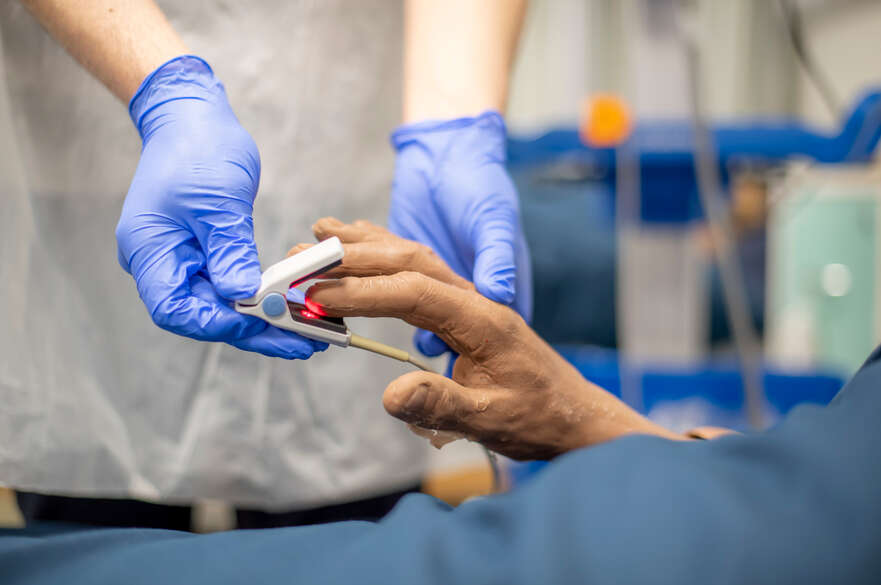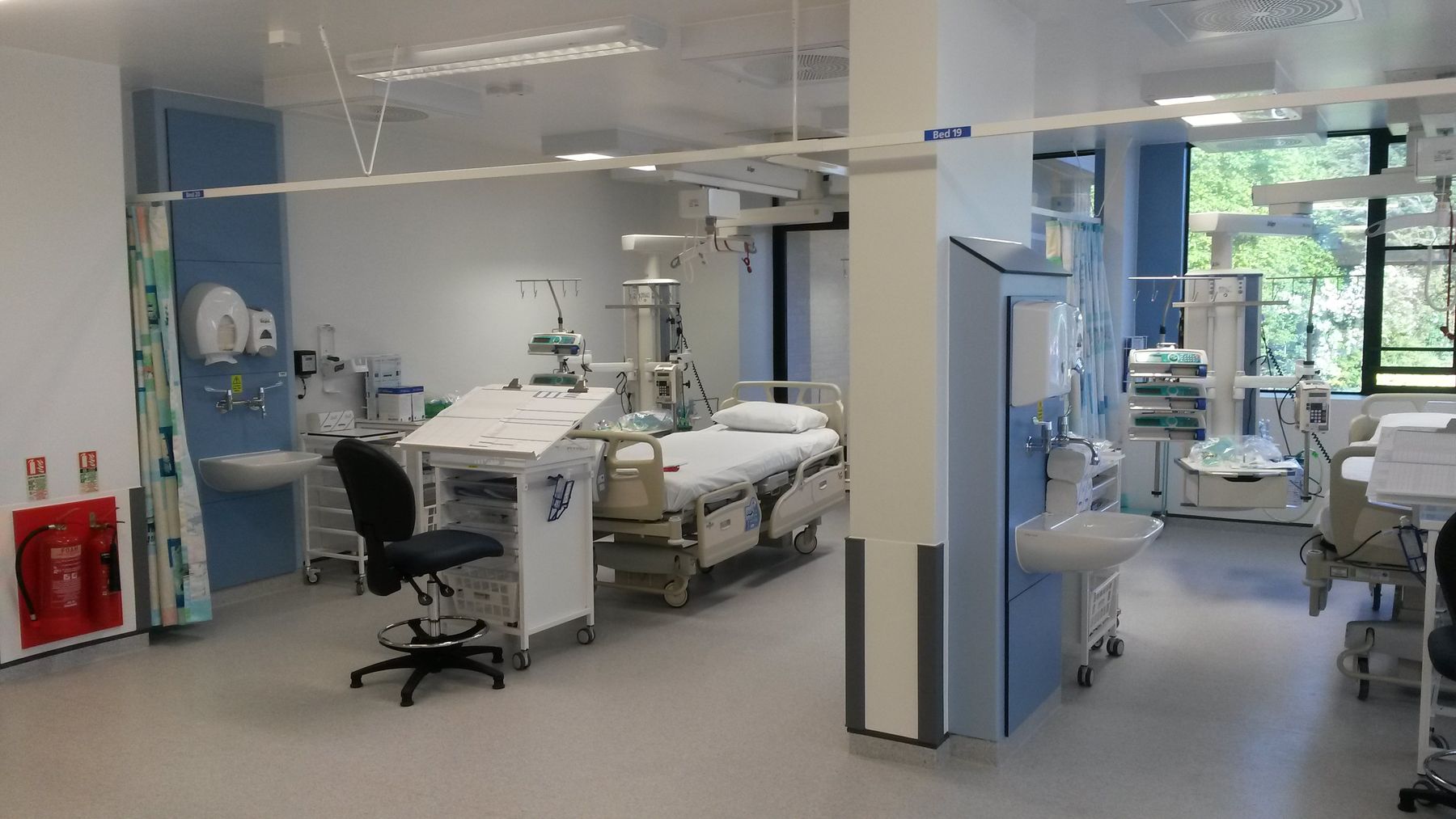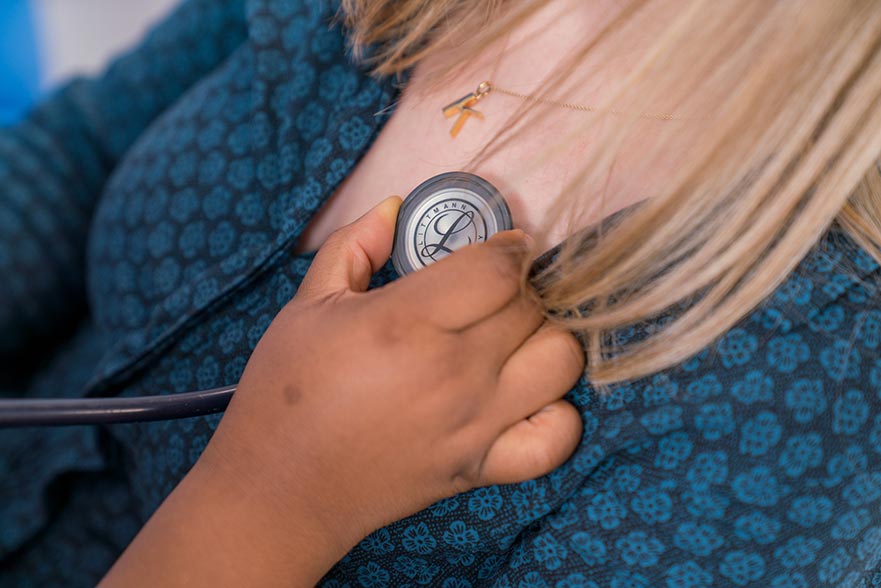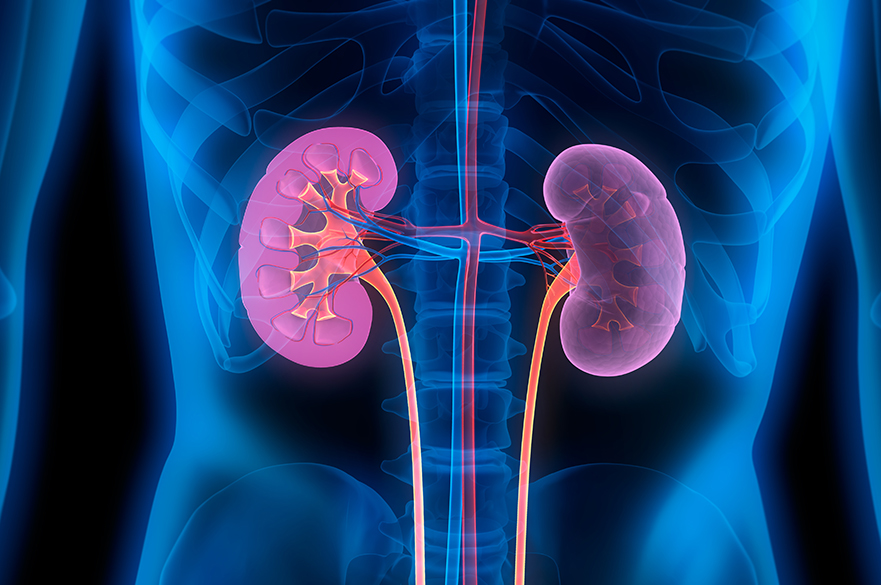Neonatal Care BSc (Hons); Postgraduate Certificate in; Postgraduate Diploma in; MSc; Professional Certificate in
About this course
The Institute of Health and Allied Professions at NTU offers a comprehensive suite of continuous professional development (CPD) courses that have been designed and developed to meet the needs of the local health sector workforce.
The principle aims for this course is to provide post-qualification continuing professional development in the speciality of Neonatal care, striving to enhance the knowledge skills and values of staff within neonatal care areas at a qualified in speciality level. This course has been developed in collaboration with Nottingham University Hospitals NHS Trust and represents core education and training pertinent to neonatal speciality areas, including the intensive care environment.
Why do this course?
What you’ll study
The Neonatal Qualified in Speciality Course curriculum is aligned to the national competence framework for neonatal nursing. This course offers a unique blend of evidence and contemporary clinical practice to support the development of holistic skilled neonatal nurses working with families at the centre of care delivery. The course consists of two modules, each worth 30 credit points.
Content includes critical appraisal of anatomy and pathophysiology to inform the assessment and management of the neonate, legal and ethical implications of neonatal care, communication in complex circumstances and contemporary approaches to leadership. The course will encourage students to critically reflect on current practice, discuss underpinning research and professional guidance and debate case-studies to develop clinical expertise and inform clinical decision making.
The learning environment and level of teaching will be the same for each level of study (post registration certificate, (level 6) or postgraduate (level 7). The level of study and therefore attainment will be differentiated at assessment only, students will be assessed at either Level 6 or 7.
- Professional Certificate (Level 6)
- Postgraduate Certificate (Level 7)
- Postgraduate Diploma (Level 7)
- BSc
- MSc
Fundamentals of Neonatal Care (30 credits)
This module focuses on the assessment and management of the neonate in low dependency and special care settings. Topics include anatomy and pathophysiology the psychosocial and cultural needs of the family unit in the neonatal setting, developing therapeutic relationships and leadership strategies to facilitate collaboration and effective performance of the team.
Intensive Care of the Neonate (30 credits)
This module focuses on the assessment and management of the neonate in high dependency and intensive care settings. Topics include legal and ethical implications of neonatal care, pharmacological interventions, and the resuscitation of the neonate.
Fundamentals of Neonatal Care (30 credits)
This module focuses on the assessment and management of the neonate in low dependency and special care settings. Topics include anatomy and pathophysiology the psychosocial and cultural needs of the family unit in the neonatal setting, developing therapeutic relationships and leadership strategies to facilitate collaboration and effective performance of the team.
Intensive Care of the Neonate (30 credits)
This module focuses on the assessment and management of the neonate in high dependency and intensive care settings. Topics include legal and ethical implications of neonatal care, pharmacological interventions, and the resuscitation of the neonate.
Core modules
Research in Nursing, Health and Social Care (30 credits)
This module explores contemporary issues and debates in health research. The module will prepare students with the knowledge and skills required to undertake research in their chosen field of professional practice.
Fundamentals of Neonatal Care (30 credits)
This module focuses on the assessment and management of the neonate in low dependency and special care settings. Topics include anatomy and pathophysiology the psychosocial and cultural needs of the family unit in the neonatal setting, developing therapeutic relationships and leadership strategies to facilitate collaboration and effective performance of the team.
Intensive Care of the Neonate (30 credits)
This module focuses on the assessment and management of the neonate in high dependency and intensive care settings. Topics include legal and ethical implications of neonatal care, pharmacological interventions, and the resuscitation of the neonate.
Optional modules (30 credits)
Leadership in Nursing, Health & Social Care Practice (30 credits)
The module will consider contemporary leadership theory, policy and research and will engage learners in critical reflection on their leadership approach. It aims to support you to develop a critical awareness of different leadership theories and styles, critically analyse the challenges facing leaders working in healthcare and/or social care environment, construct strategies to lead change and innovation in their local area, and consider the role of the leader in addressing resilience of self and colleagues in the healthcare and/or social care environment.
Independent and Supplementary Prescribing for Non-Medical Practitioners (40 credits)
This module will provide learners with the knowledge and skills required to meet the NMC and HCPC standards for Independent and Supplementary Prescribing for Non-medical prescribers. You will develop your skills to be able to assess, diagnose and prescribe for a range of conditions, be introduced to the knowledge and skills to work in partnership with other professionals to deliver evidence-based care in diverse health and social care settings, and be equipped with professional values and behaviours to demonstrate self-awareness, leadership and resilience.
Innovation in Nursing, Health and Social Care Practice (30 credits)
In this module you will explore creativity, innovation and entrepreneurial thinking in nursing, health and social care. You'll critically analyse approaches to creative problem solving, and you'll be equipped with the knowledge and skills needed to innovate in response to an ever-changing environment and associated challenges.
Fundamentals in Acute Medicine and Emergency Care (30 credits)
This module will focus on the contemporary fundamental concepts in Acute Medicine and Emergency Care. Learners will develop their core knowledge and critical thinking skills within these specialities. Through a symptom-based focus with constant consideration of application to practice, learners will enhance clinical practice by improving their ability to assess patients and plan, manage and critically evaluate their care. This will be achieved through pre-learning, classroom-based, patient scenario, simulation-based activities and completion of a work based portfolio.
Developing Acute and Emergency Care (30 credits)
After completing the Fundamentals in Emergency and Acute medicine, learners on this module will focus on Developing Acute and Emergency Care. Emphasis will be placed on gaining the critical knowledge and enhanced skills required for developing expertise and confidence in this area. There will be a symptom based approach to the learning and focus on the continuing care of patients.
Emergency Care (30 credits)
After completing the Fundamentals in Emergency and Acute Medicine module, you will focus on the Emergency Medicine speciality. You'll focus on gaining the key knowledge and skills required for developing expertise and confidence in this unique speciality. There will be a symptom-based focus to learning, with constant consideration of application to clinical practice.
Fundamentals of Renal Care (30 credits)
This module aims to develop a critical understanding of acute kidney injury and chronic kidney disease. The module considers contemporary approaches to the assessment and management of renal conditions, along with strategies to promote patient engagement and participation in self-management.
Contemporary Approaches in Renal Disease (30 credits)
This module aims to develop a critical understanding of active therapeutic interventions which are used in the management of renal pathology. The module also considers contemporary approaches to leadership to facilitate effective collaboration and effective performance of the multidisciplinary team.
Lifecycle of Clinical Research (30 credits)
This module aims to develop understanding of the practical and regulatory issues associated with carrying out health and social care related research. You’ll explore different types of research studies and their challenges, discuss research design and delivery including the importance of patient and public involvement, and learn how to identify funding and resource requirements.
Leading Health and Social Care Research (30 credits)
This module aims to help you understand the principles of planning, patient recruitment, piloting and feasibility assessments. You will explore how collaboration can enhance study feasibility and quality, appraise the attributes of an inclusive researcher, and develop a critical and reflective approach to leading and delivering health and social care research.
Trial Management (30 credits)
This module will equip you with the knowledge and skills to manage a research study, including project planning, resource management and risk management. Your skills and confidence to manage a clinical trial will be enhanced, and you will explore strategies that can be implemented to ensure strategies are completed on-time and within budget.
Research Governance (15 credits)
In this module you will review Good Clinical Practice (GCP) principles for conducting and reporting clinical trials. You will discuss quality assurance and quality control systems used for monitoring and audit, and learn to effectively prepare for an inspection.
Research Ethics (15 credits)
In this module you will develop an awareness of the key ethical issues in research, the role of ethics committees, and research governance. You will discuss how research ethics and research integrity protect the safety of research participants, and explore how to identify ethical issues across the design, delivery and management of research.
Core modules
Evidence in Clinical Practice (30 credits)
This module recognises the importance of clinical expertise as key to interpreting and applying research and professional evidence into practice. During this module students will learn how to find evidence and critically analyse theoretical, scientific, and ethical aspects of their chosen sources. Students will consider how evidence can inform proactive and make credible recommendations for change.
Fundamentals of Neonatal Care (30 credits)
This module focuses on the assessment and management of the neonate in low dependency and special care settings. Topics include anatomy and pathophysiology the psychosocial and cultural needs of the family unit in the neonatal setting, developing therapeutic relationships and leadership strategies to facilitate collaboration and effective performance of the team.
Intensive Care of the Neonate (30 credits)
This module focuses on the assessment and management of the neonate in high dependency and intensive care settings. Topics include legal and ethical implications of neonatal care, pharmacological interventions, and the resuscitation of the neonate.
Independent Study (30 credits)
This module provides you with the opportunity for originality and intellectual independence into specific area of your practice. Students will be able to choose between an impact study (e.g. service evaluation or audit), a clinical change project, or critical review of practice.
Core modules
Research in Nursing, Health and Social Care (30 credits)
This module explores contemporary issues and debates in health research. The module will prepare students with the knowledge and skills required to undertake research in their chosen field of professional practice.
Fundamentals of Neonatal Care (30 credits)
This module focuses on the assessment and management of the neonate in low dependency and special care settings. Topics include anatomy and pathophysiology the psychosocial and cultural needs of the family unit in the neonatal setting, developing therapeutic relationships and leadership strategies to facilitate collaboration and effective performance of the team.
Intensive Care of the Neonate (30 credits)
This module focuses on the assessment and management of the neonate in high dependency and intensive care settings. Topics include legal and ethical implications of neonatal care, pharmacological interventions, and the resuscitation of the neonate.
Independent Study (60 credits)
This module provides you with the opportunity for originality and intellectual independence into specific area of your practice. Students will be able to choose between an impact study (e.g. service evaluation or audit), a clinical change project, or critical review of practice.
Optional modules (30 credits)
Leadership in Nursing, Health & Social Care Practice (30 credits)
The module will consider contemporary leadership theory, policy and research and will engage learners in critical reflection on their leadership approach. It aims to support you to develop a critical awareness of different leadership theories and styles, critically analyse the challenges facing leaders working in healthcare and/or social care environment, construct strategies to lead change and innovation in their local area, and consider the role of the leader in addressing resilience of self and colleagues in the healthcare and/or social care environment.
Independent and Supplementary Prescribing for Non-Medical Practitioners (40 credits)
This module will provide learners with the knowledge and skills required to meet the NMC and HCPC standards for Independent and Supplementary Prescribing for Non-medical prescribers. You will develop your skills to be able to assess, diagnose and prescribe for a range of conditions, be introduced to the knowledge and skills to work in partnership with other professionals to deliver evidence-based care in diverse health and social care settings, and be equipped with professional values and behaviours to demonstrate self-awareness, leadership and resilience.
Innovation in Nursing, Health and Social Care Practice (30 credits)
In this module you will explore creativity, innovation and entrepreneurial thinking in nursing, health and social care. You'll critically analyse approaches to creative problem solving, and you'll be equipped with the knowledge and skills needed to innovate in response to an ever-changing environment and associated challenges.
Fundamentals in Acute Medicine and Emergency Care (30 credits)
This module will focus on the contemporary fundamental concepts in Acute Medicine and Emergency Care. Learners will develop their core knowledge and critical thinking skills within these specialities. Through a symptom-based focus with constant consideration of application to practice, learners will enhance clinical practice by improving their ability to assess patients and plan, manage and critically evaluate their care. This will be achieved through pre-learning, classroom-based, patient scenario, simulation-based activities and completion of a work based portfolio.
Developing Acute and Emergency Care (30 credits)
After completing the Fundamentals in Emergency and Acute medicine, learners on this module will focus on Developing Acute and Emergency Care. Emphasis will be placed on gaining the critical knowledge and enhanced skills required for developing expertise and confidence in this area. There will be a symptom based approach to the learning and focus on the continuing care of patients.
Emergency Care (30 credits)
After completing the Fundamentals in Emergency and Acute Medicine module, you will focus on the Emergency Medicine speciality. You'll focus on gaining the key knowledge and skills required for developing expertise and confidence in this unique speciality. There will be a symptom-based focus to learning, with constant consideration of application to clinical practice.
Fundamentals of Renal Care (30 credits)
This module aims to develop a critical understanding of acute kidney injury and chronic kidney disease. The module considers contemporary approaches to the assessment and management of renal conditions, along with strategies to promote patient engagement and participation in self-management.
Contemporary Approaches in Renal Disease (30 credits)
This module aims to develop a critical understanding of active therapeutic interventions which are used in the management of renal pathology. The module also considers contemporary approaches to leadership to facilitate effective collaboration and effective performance of the multidisciplinary team.
Lifecycle of Clinical Research (30 credits)
This module aims to develop understanding of the practical and regulatory issues associated with carrying out health and social care related research. You’ll explore different types of research studies and their challenges, discuss research design and delivery including the importance of patient and public involvement, and learn how to identify funding and resource requirements.
Leading Health and Social Care Research (30 credits)
This module aims to help you understand the principles of planning, patient recruitment, piloting and feasibility assessments. You will explore how collaboration can enhance study feasibility and quality, appraise the attributes of an inclusive researcher, and develop a critical and reflective approach to leading and delivering health and social care research.
Trial Management (30 credits)
This module will equip you with the knowledge and skills to manage a research study, including project planning, resource management and risk management. Your skills and confidence to manage a clinical trial will be enhanced, and you will explore strategies that can be implemented to ensure strategies are completed on-time and within budget.
Research Governance (15 credits)
In this module you will review Good Clinical Practice (GCP) principles for conducting and reporting clinical trials. You will discuss quality assurance and quality control systems used for monitoring and audit, and learn to effectively prepare for an inspection.
Research Ethics (15 credits)
In this module you will develop an awareness of the key ethical issues in research, the role of ethics committees, and research governance. You will discuss how research ethics and research integrity protect the safety of research participants, and explore how to identify ethical issues across the design, delivery and management of research.
We regularly review and update our course content based on student and employer feedback, ensuring that all of our courses remain current and relevant. This may result in changes to module content or module availability in future years.
How you're taught
Delivery mode
Teaching will be delivered using a variety of approaches, which include, lectures, problem-based learning, peer-learning, simulation and reflection on clinical practice. Each module will encourage students to examine the knowledge and skills requirements for advanced and competent practice, along with opportunity to explore specific themes based upon experiences in practice.
The course is delivered through in-person taught days at our Clifton Campus and supported by online resources on the NTU Online Workspace (NOW), and will include teaching from a variety of clinicians with specialist expertise. This co-delivery of education will enable learners to benefit from both clinical and academic knowledge to augment their learning and provides a symbiotic approach to professional development.
Clinical area
Working in a Neonatal area is a compulsory component of the course to enable you to develop the necessary competencies required for the course. In order to complete the skills portfolio, you will need to have access to appropriate learning opportunities through your practice settings and that your employer will allow you to use your work in these settings as learning opportunities for the modules on the course.
How you're assessed
BSc Neonatal
- Critical review of the literature
- Presentation
- Case Study
- Observed structured clinical examination
- Portfolio
- Project report
MSc Neonatal
- Research proposal
- Presentation
- Case Study
- Observed structured clinical examination
- Portfolio
- Project report
Prof/PG Certificate Neonatal
- Presentation
- Reflective assignment
- Observed structured clinical examination
- Case study
- Portfolio
Campus and facilities
The purpose-built Health & Allied Professions (HAP) Centre is home to our world-class teaching, practice, research and scholarship in the Institute of Health and Allied Professions (IHAP).
Our self-contained, community-focused Clifton Campus has been designed to keep our students busy between lectures. Catch-up with your coursemates in the Pavilion’s barista café and Refectory; brainstorm group presentations in chic and stylish study spaces; enjoy some proper R&R in The Point, home of our Students’ Union. The campus also hosts the multimillion-pound Clifton Sports Hub, offering great options for everyone — whatever your interests, and however competitive you’d like to get!
You’re also right next to the bright lights of Nottingham — one of Britain’s top 10 student cities, and one of Europe’s top 25. All through termtime, a dedicated on-campus bus service will get you to the heart of the action (and back) in under 25 minutes. You’ll find a city stuffed with history, culture, and well-kept secrets to discover at your leisure: enjoy lush green spaces, galleries, hidden cinemas and vintage shopping by day, and an acclaimed food, drink and social scene by night.
Take our virtual tour to get a real feel for the campus.
Entry requirements
UK students
BSc Neonatal
- Applicants will be registered health professionals working in a neonatal environment for all the course options
- Applicants must have manager support
MSc Neonatal
- Applicants will be registered health professionals working in a neonatal environment for all the course options
- Applicants must have a level 6 qualification or evidence of the ability to study at Level 7
- Applicants must have manager support
Professional / Postgraduate Certificate in Neonatal care
- Applicants will be registered health professionals currently working in a neonatal environment
- Post graduate certificate must have a level 6 qualification or evidence of the ability to study at Level 7
- Applicants must have manager support
Additional requirements for UK students
There are no additional requirements for this course.
International students
Unfortunately this course is not available for international students.
Additional requirements for international students
There are no additional requirements for this course.









